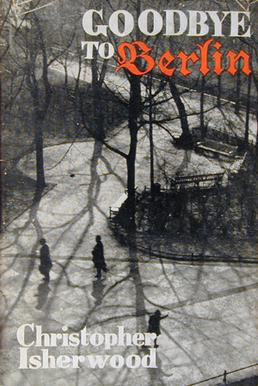 The short novel ‘Goodbye To Berlin’ by Christopher Isherwood, usually published together with his other short novel ‘Mr. Norris Changes Trains’ as The Berlin Stories, is one of the most celebrated books written about the Weimar era, that classic explosion of culture which occured in Germany between 1919 and 1933.
The short novel ‘Goodbye To Berlin’ by Christopher Isherwood, usually published together with his other short novel ‘Mr. Norris Changes Trains’ as The Berlin Stories, is one of the most celebrated books written about the Weimar era, that classic explosion of culture which occured in Germany between 1919 and 1933.
Goodbye To Berlin is a semi autobiographical account of Isherwood’s adventures as an expatriate living in Berlin from 1930-1933. It’s a series of 6 chronological short stories focusing on an interconnected group of people living in a wild and glamorously decadent time, with an undercurrent of dread and prejudice seeping into the cracks around them.
This wonderful novel was later made into the play ‘I Am A Camera’ in 1951, which in turn was made into a musical in 1966, and which finally lands us on our post for today, the brilliant 1972 movie adaption of said musical, Cabaret.
Cabaret, starring a young Liza Minelli and Michael York, a timeless Joel Grey, and directed by the great Bob Fosse, is probably one of the best film adaptions of a musical, a great little stylized portrait of the Weimar era, and a wonderful study of a group of personalities as they come in and out of each other’s lives while pursuing their various dreams and vices. All of this is set against the background of a seedy cabaret, The Kit Kat club and wisely, all songs in the movie are only sung and performed within the stage show of the club.
[youtube=http://www.youtube.com/watch?v=_D7AebhY4qg]
To be honest, the movie reminds me of my 20s. In any case, the movie also captures a wonderful sense of mood. Wild and free behavior is underpinned by basic selfishness, while slowly but surely a dark militantness, the nazi party, is growing, making it’s way into a society unprepared and unable to defend against it.
[youtube=http://www.youtube.com/watch?v=CX-24Zm0bjk]
In the original book Sally Bowles is English and Cliff Bradshaw (who is basically Christopher UInderwood) is American. Numerous other difference abound, for instance the fact that Sally Bowles is actually rather bad singer and the Kit Kat Club is a real dive, but the movie works with it’s liberties because the characters do in fact live and breath on film. I’ve personally known Sally Bowles several times. Not the actual person, but i’ve met the character on several different occasions, wearing a different face each time, but unmistakable.
Also, the performance of Joel Grey as the Master of Ceremonies cannot be overhyped. He has almost no role in the film outside of the cabaret numbers, and yet his performance casts a shadow over the entire film. You will walk away remembering Sally Bowles and the MC.
As a young man, this film and in particular the MC character impacted me tremendously. I explored the use of dark narrators for some time afterwards and in general the use of narration in my work which aims to tell stories has been a career long exploration. (we’ll get into that more in a later post)
Naturally, it is obligatory that we end with the title number. Despite having been used by cheesy performers as a saccharine, feel good song, the actual number is darker and more desperate. Sally is flashy and captivating, but fragile and desperate for a success which, in Germany anyway, we know is doomed although she doesn’t as yet. Only 19 years old, all she has is her moment on stage which is the one thing in her mixed up life she shines at.
[youtube=http://www.youtube.com/watch?v=moOamKxW844]
Let's connect! Here is where you can find me: